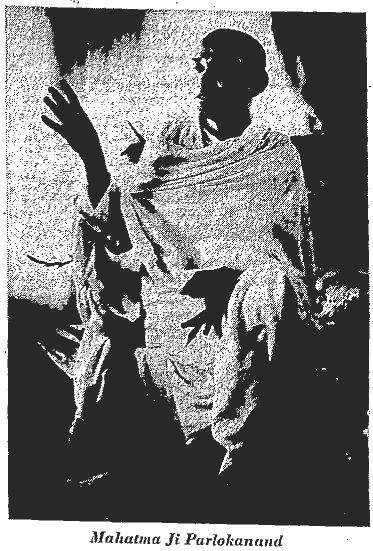 Through A 'Third Eye' Comes The 'Divine Light'
Through A 'Third Eye' Comes The 'Divine Light'
(Of The Capital Times Staff)
A stranger walking into the Divine Light Mission at 106 N. Brearly St. might well feel that he has walked into a different world.
The 10 persons who live in the house as well as some 30 more Madison-area residents who are part of the Divine Light Mission are disciples of Guru Maharaj Ji, a 15-year old spiritual leader from India.
To his followers, Guru Maharaj Ji is "the lord of the whole universe" and the source of "true knowledge."
One of the Guru's 2,000 mahatmas visited the Madison mission recently. While he was here, Mahatma Ji Parlokahand talked with reporters and sect members about the teachings of the Guru.
The central philosophy of the sect is that a person must acquire knowledge about self. When a person is ready to "receive knowledge," in the terminology of the religion, he or she goes through a spiritual process by which the "third eye" is opened.
With this "third eye," said Mahatma Ji, the person can see the "divine' light" - thus the name of the organization. As a person advances in knowledge, the "inner ear" opens to hear the "celestial harmony," then finally "the heart is opened" and one can feel "the inner vibration."
All these rather mystical terms refer to an experience that members of the sect have a difficult time explaining. Mahatma Ji described it as "becoming very peaceful, happy, feeling loving - you start to understand everything perfectly."
The source of this "knowledge," this peace and contentment is Guru Maharaj Ji - the perfect master or teacher of perfection.
Members of the sect believe that the Guru received his spiritual power from his father in 1966 at the age of 8. They believe the power has its origins before the beginning of the universe.
When a person "receives knowledge," life externally may not change drastically. People continue working ai their jobs, eating, doing the wash. Internally, though, the sect members claim that their perception of everything has changed.
Everything - work, meals, play - is pleasure now. "It's an eternal high," is the way one person described it.
Several of the persons at the Brearly Street house acknowledge being involved in drugs or political movements before "receiving knowledge," but they say those "false highs" are only temporary. Even sex' is a momentary pleasure, sublimated for some in the experience of seeing the "divine light."
There are no ethical strictures against drugs, sex or anything else, the members say. It's just that they are so enthralled by their religious experience that those things don't matter.
Likewise, there are no moral imperatives to become involved in dealing with any social problems. The answer to the world's troubles, according to the Guru's philosophy, is for all the people of the world to "receive knowledge."
Thus Mahatma Ji said it did not bother him that people were being killed in wars, since he could do nothing to stop wars and since "it doesn't really matter if you die."
Likewise, hungry people do not upset Mahatma Ji.
"If people are hungry, let them come to Guru Maharaj Ji," he said. "He will give food to anyone who asks for it. When he runs out of food, then there is no more to give."
If suffering is not a problem, neither is wealth. "If you are perfect," Mahatma Ji maintained, "material things are good so long as they do not poison you."
The Guru himself reportedly is personally wealthy. The Mahatma explained, "People love him, so they purchase for him an airplane, a car (a Rolls-Royce), all these things. He doesn't want all these things but their love is so strong."
The sect members deny that they must give up their possessions when they "receive knowledge," but they say that they share what they earn. Nationally, the Divine Light organization is wealthy enough to put out a slick monthly magazine and maintain 19 missions.
The sect began in this country in 1971 when six persons returned from India after "receiving knowledge" from the Guru.
Today the group claims about 50,000 members nationally. In addition to the 40 in Madison, there are another 100 in Milwaukee.
Membership statistics, bank accounts, details about their lives are all dismissed by sect members as unimportant. They prefer to emphasize the philosophy of their lives - a philosophy that stresses individualism - "I am responsible for myself," one person said - but blends it with a close sense of community - hymns to the Guru, modified Christian hymns, common belief all unify the individuals.
As Mahatma Ji and the sect members talked, one member approached the display in the corner of the room. A picture of the Guru stood on a chair draped with white. Overhead was a canopy of gold silk, and the chair was flanked by peacock feathers and flowers. The young man bent and touched his head to a white pillow, then lit a stick of incense.
It was a simple ritual, similar to one often seen in Christian churches with some variations. The sect has many similarities to other sects at other times. But its Eastern philosophy jars with the beliefs of the West.
"It's the difference between man learning by suffering pain and man learning by happiness. Which is better?" asked Mahatma Ji.
The people at Divine Light Mission have chosen learning by happiness. Others might well ask how long the happiness can last.
